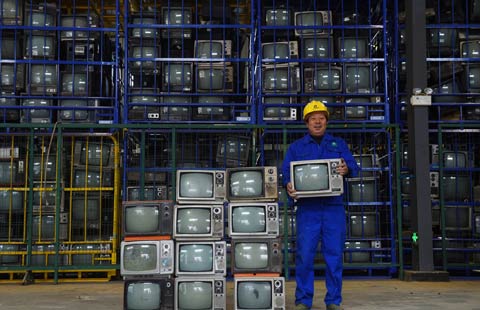Leadership reshuffle set for oil giants
By DU JUAN (China Daily) Updated: 2015-05-05 07:31Top-level changes in management may be impetus for structural reforms, say analysts
A leadership shuffle at the nation's oil companies will open up more possibilities of reform, both in terms of individual corporate structures and overall industry operations, analysts said.
The Organization Department of the Central Committee of the Communist Party of China on Monday announced new top executives of China National Petroleum Corp, China Petrochemical Corp (known as Sinopec) and China National Offshore Oil Corp, a move that is expected to promote the market-driven reform of the energy industry.
Fu Chengyu, 64, an aggressive reformer and innovator in the domestic oil industry, retired as chairman of Sinopec, Asia's biggest refiner.
He was replaced by Wang Yupu, 59, deputy head of the Chinese Academy of Engineering.
During a meeting to review the company's interim results in August, Fu told shareholders that the central government had decided to let him stay in his post indefinitely.
Therefore, his retirement now comes as a surprise to industry insiders who had expected that he would lead the company for several more years.
"Bringing in a new head with an academic background will benefit Sinopec's upstream exploration sector in research and development," said Li Li, research director at ICIS Energy, a Shanghai-based energy information consultancy.
"Fu had an open mind in terms of State-owned enterprise reform when it came to introducing private investors into the oil business", she said. "Whether Wang follows Fu's strategy will have a big impact on Sinopec's development."
Wang Yilin, former chairman of CNOOC, became a man with a "big burden". He has been named chairman of CNPC, replacing Zhou Jiping, who retired at the age of 63.
CNPC's upstream business has taken a hit from falling oil prices, with first-quarter profit down more than 80 percent year-on-year.
Li also noted that CNPC had not made any "solid progress" in the mixed-ownership reform drive encouraged by the central government.
"Compared with Sinopec, CNPC is lagging, with no clear direction for its reform," she said.
Yang Hua, who was chairman of CNOOC, will be the chairman of CNOOC after Wang Yilin leaves for CNPC.
"Of course, there might be some personality issues when it comes to the management style, but CNOOC's international strategy will continue to be its biggest advantage among the three giants," said Lin Boqiang, director of the China Center for Energy Economics Research at Xiamen University.
Setting a new course
Wang Yilin
Chairman of China National Petroleum Corp
Born in September 1956, Wang graduated from the China University of Petroleum with a Bachelor of Science degree in petroleum, geology and exploration in 1982.
Wang started his career in 1982, and had served as general manager and Party chief of Xinjiang Oilfield Company of CNPC.
In December 2003, he became a vice-president of CNPC. Wang became chairman and Party chief of China National Offshore Oil Corp in April 2011.
In May 2015, he became the president of CNPC after former chairman Zhou Jiping, 63, retired.
Yang Hua
Chairman of China National Offshore Oil Corp
Born in May 1961, Yang graduated from the China University of Petroleum with a Bachelor of Science degree in petroleum engineering in August 1982.
He received an MBA degree from the Massachusetts Institute of Technology in May 2004.
Yang joined CNOOC in August 1982 and served in a number of positions including president of Overseas Oil & Gas Corp Ltd, senior vice-president, chief financial officer, president, chief executive officer and vice-chairman of CNOOC Ltd, and an assistant president of CNOOC.
In April 2010, Yang became vice-president of CNOOC and in 2015 became the chairman of CNOOC. Former chairman Wang Yilin was appointed president of CNPC.
Wang Yupu
Chairman of Sinopec Group
Born in October 1956, Wang completed his bachelor's degreee in 1982 from the Northeast Petroleum University in Daqing, Heilongjiang province.
He joined the Daqing Petroleum Administration in 1982 and joined Daqing Oilfield Co Ltd in 2000. In February 2008, he was appointed president of Daqing Oilfield Co Ltd and director of Daqing Petroleum Administration.
In August 2009, he was elected as vice-governor of Heilongjiang province.
In June 2014, he became the deputy Party chief and vice-president of the Chinese Academy of Engineering. In April 2015, Wang was appointed president of Sinopec. Former chairman Fu Chengyu retired.
- Six reasons stopping Apple Watch from ticking in China
- Robust property sales over holiday
- New leaders take reins at oil giants
- Chinese small firms save 24b yuan in taxes in Q1
- Chinese shares close mixed Monday
- A-share companies post 6.5% rise in net profit
- Certification institution to help Chinese enterprises go global
- China reports safer railway operations in 2014
















